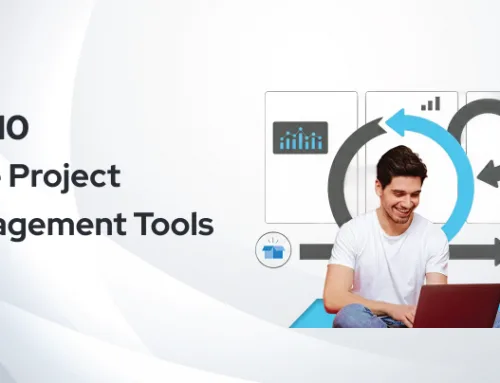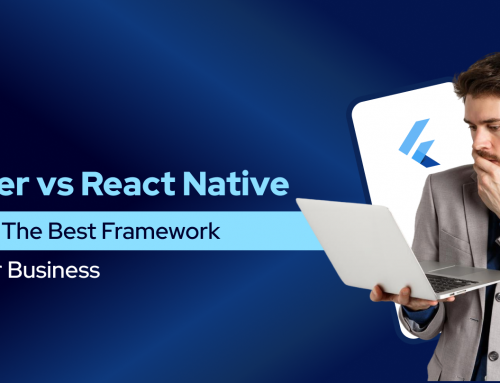Table of Contents
Global enterprises are expected to spend a staggering $750.2 billion on outsourcing software development by 2030. It clearly shows why businesses need a flexible talent model while hiring software development teams. Many organizations grapple with communication bottlenecks, hidden onboarding costs, misaligned project goals, code consistency issues, scope creep, and intellectual property protection.
The constant anxiety of finding a technical partner who can help organizations overcome these issues is real. This is where the dedicated software development team model comes into play. Unlike fragmented outsourcing, dedicated teams are fully aligned with your objectives, working exclusively on your project to guarantee rapid delivery, technical depth, and quality you can trust.
Of course, even with dedicated teams, critical challenges remain. For instance, how do you source the right expertise, maintain transparency, and avoid unexpected costs?
Many organizations struggle to decide between dedicated software development and traditional outsourcing. This guide helps your organization with a comprehensive guide on hiring a dedicated development team.
You’ll discover what makes a team truly “dedicated,” why the model will suit your needs, the tangible benefits and unavoidable hurdles, plus proven tips to select a partner that’s the best fit for your project. Let’s dive into the reality behind dedicated development teams.
What is a Dedicated Software Development Team?
A dedicated software development team is a group of skilled developers, designers, quality assurance officers, testers, and project managers who work exclusively on a single client project. This engagement model provides a dedicated team of professionals who collaborate with your in-house team to deliver software efficiently.
A dedicated software development team has,
Team Roles and Responsibilities
While these are the kind of roles included in a dedicated team, understanding different offering types becomes essential.
Offshore vs Nearshore vs Onshore Dedicated Teams
Choosing between an offshore, onshore, and nearshore dedicated software development team for your project depends on specific requirements. For example, if you want to optimize the total cost of ownership and scale operations, an offshore dedicated software development team is the best option.
At the same time, if your goal is to ensure seamless daytime collaborations and quicker business alignment, choose nearshoring app development. Lastly, if you are from a highly regulated environment, onshore teams are the best option.
Comparison: Offshore vs Nearshore vs Onshore Dedicated Teams
What are the key Benefits of a Dedicated Software Development Team?
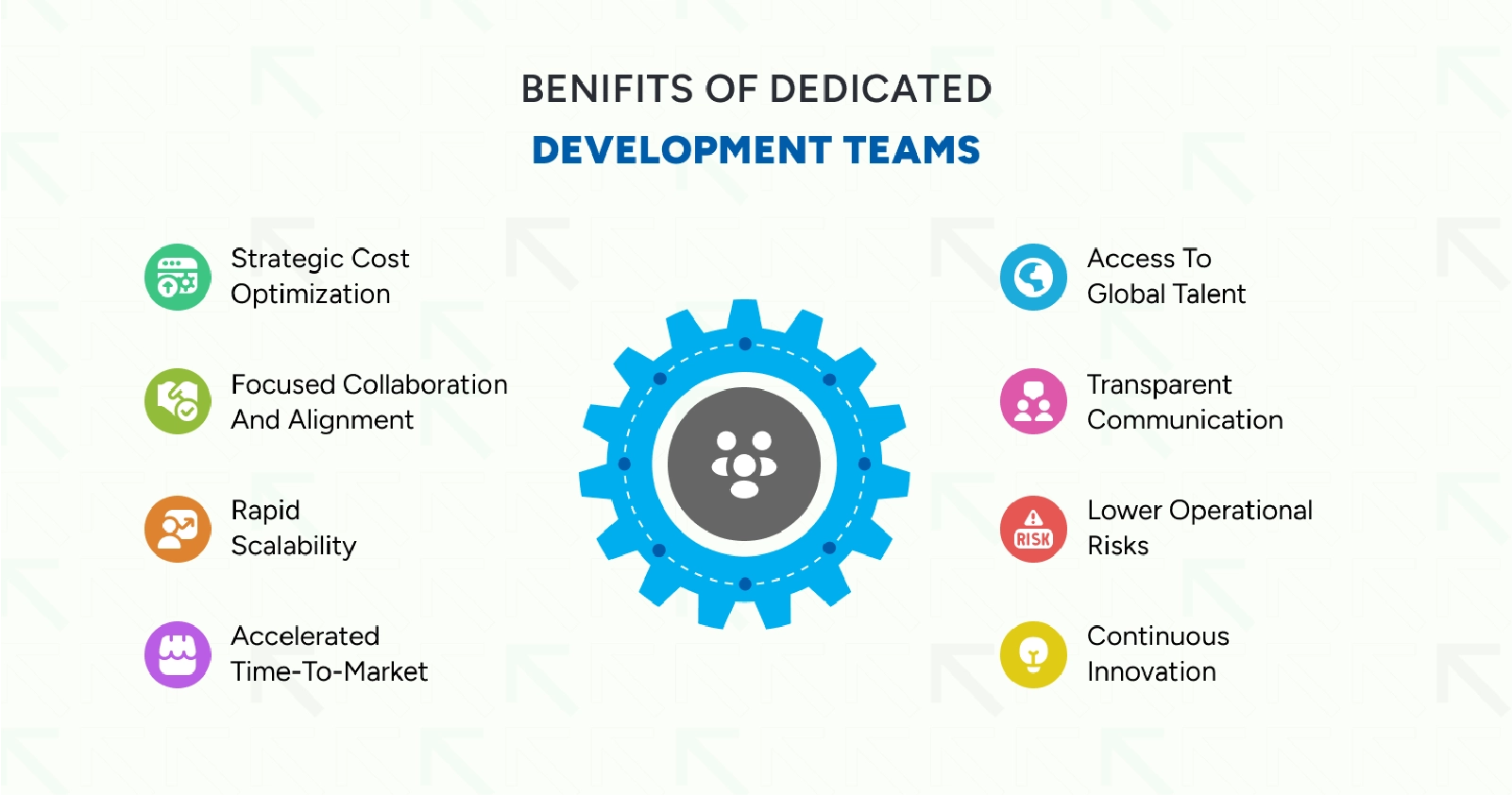
The dedicated software development team model offers significant advantages in business, operations, and technology. It improves resource efficiency, accelerates delivery, and ensures project control, making it ideal for companies managing continuous development or scaling digital products. Each benefit below highlights a distinct value that search algorithms can identify and extract independently.
1. Strategic Cost Optimization
A dedicated team helps businesses reduce overhead costs by eliminating recruitment, training, and infrastructure expenses. You only pay for the actual development work completed by experts, allowing predictable budgeting and long-term savings without compromising quality.
2. Focused Collaboration and Alignment
Dedicated developers work solely on your project, ensuring complete alignment with business goals. This focused collaboration enables consistent progress tracking and better integration with your internal workflows, improving productivity and accountability.
3. Rapid Scalability
As your project evolves, the team can scale up or down quickly and efficiently. New expertise can be added for complex phases, such as integrations or high-load releases, while resources can be reduced once milestones are achieved, offering maximum adaptability.
4. Accelerated Time-to-Market
Through agile sprints, automation, and DevOps practices, a dedicated software team can significantly shorten development cycles. Faster iterations mean quicker releases, helping your product reach users sooner with feature-rich and stable versions. Leveraging dedicated product engineering teams, you can ensure better ROI and profitability by timing the software release at the right time in the market.
5. Access to Global Talent
This model provides access to a diverse pool of global experts, including developers, designers, quality testers, and DevOps engineers. Businesses can leverage advanced technical skills and domain-specific expertise that is often unavailable in local markets.
6. Transparent Communication
Regular meetings, real-time dashboards, and shared project management tools ensure clarity and visibility throughout the project. Clients remain informed of progress and challenges, resulting in better decision-making and reduced miscommunication.
7. Lower Operational Risks
Dedicated teams follow structured methodologies that incorporate continuous testing, code reviews, and documentation, thereby minimizing errors and ensuring quality. Strong project governance reduces delivery uncertainties and improves reliability across release cycles.
8. Continuous Innovation
Because the team is fully invested in your product, it builds long-term familiarity with your systems and goals. This leads to proactive innovation, the implementation of emerging technologies, optimized architecture, and an improved user experience over time.
Knowing the benefits is one thing, but understanding why a business should invest in a dedicated team is quite another.
Why Hire a Dedicated Development Team For Your Business?
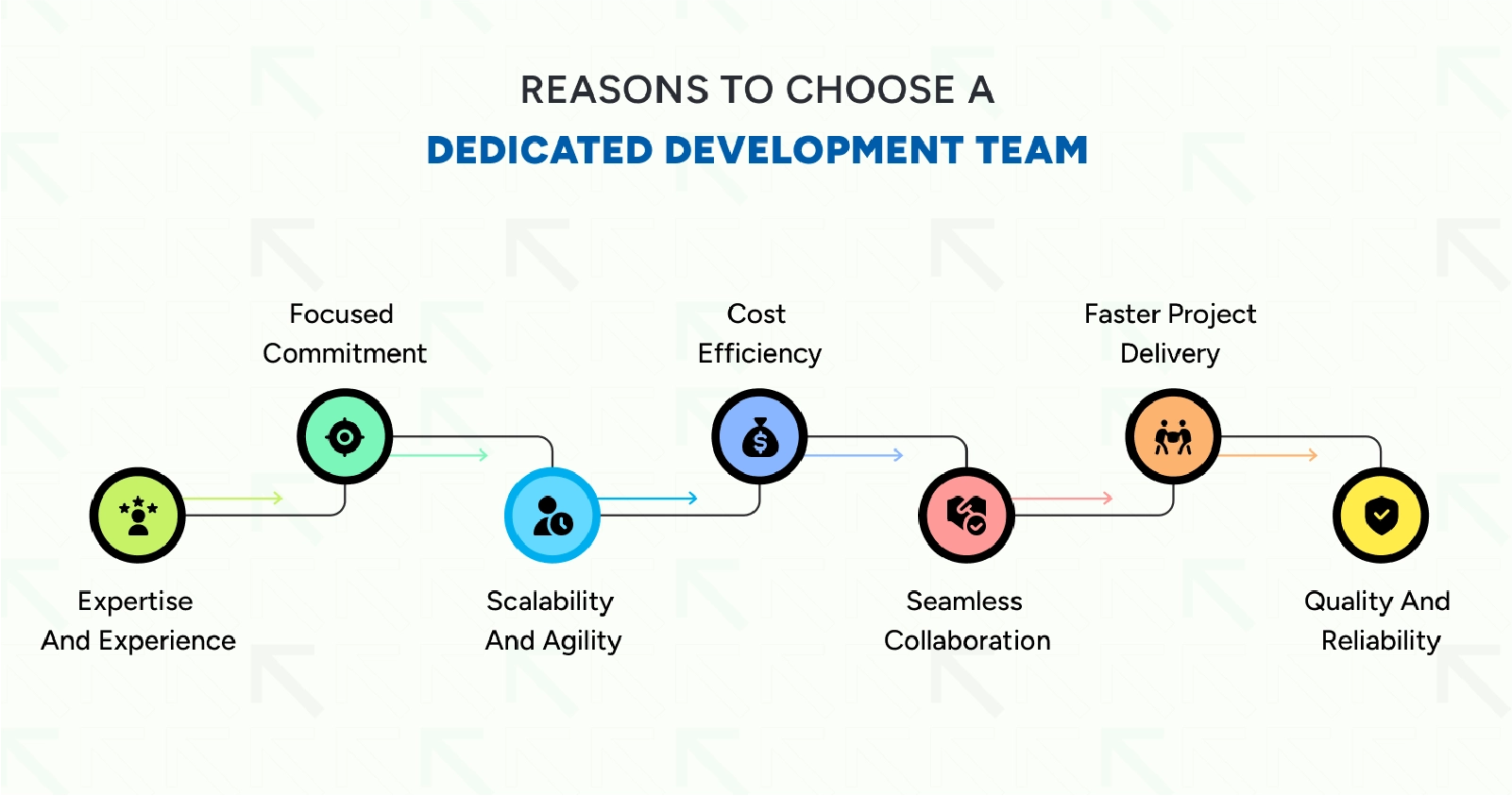
Effective teams drive modern software development operations. Outsourcing software development has been beneficial for many enterprises. However, there is one bottleneck. Many software developers offering remote development often handle multiple clients.
This can lead to issues with the software quality. Especially when enterprises and small businesses hire freelance developers for projects, the problems of quality and control persist. However, quality is not the only reason why you must hire a dedicated software development team for your business.
Here are some of the other key reasons.
1. Expertise and Experience
Gain access to professionals with specialized technical skills, helping you tackle complex challenges without expanding your in-house staff.
2. Focused Commitment
A team dedicated solely to your project maximizes attention, productivity, and problem-solving speed while ensuring complete alignment with your objectives.
3. Scalability and Agility
Easily adjust team size as your needs evolve, maintaining adaptability and quick response to market or project changes.
4. Cost Efficiency
Reduce overhead and hiring costs with transparent engagement models that provide better budget control and predictable spending.
5. Seamless Collaboration
Working long-term with the same experts fosters trust, facilitates smoother communication, and enhances stronger integration with your business vision.
6. Faster Project Delivery
Continuous focus and familiarity with project requirements help shorten development cycles from concept to deployment.
7. Quality and Reliability
Dedicated teams offer ongoing support, testing, and maintenance to keep your software stable and high-performing over time.
Now that you know why you need a dedicated team for your software development project, here is how you can choose one.
How to Choose the Best Dedicated Software Development Team?
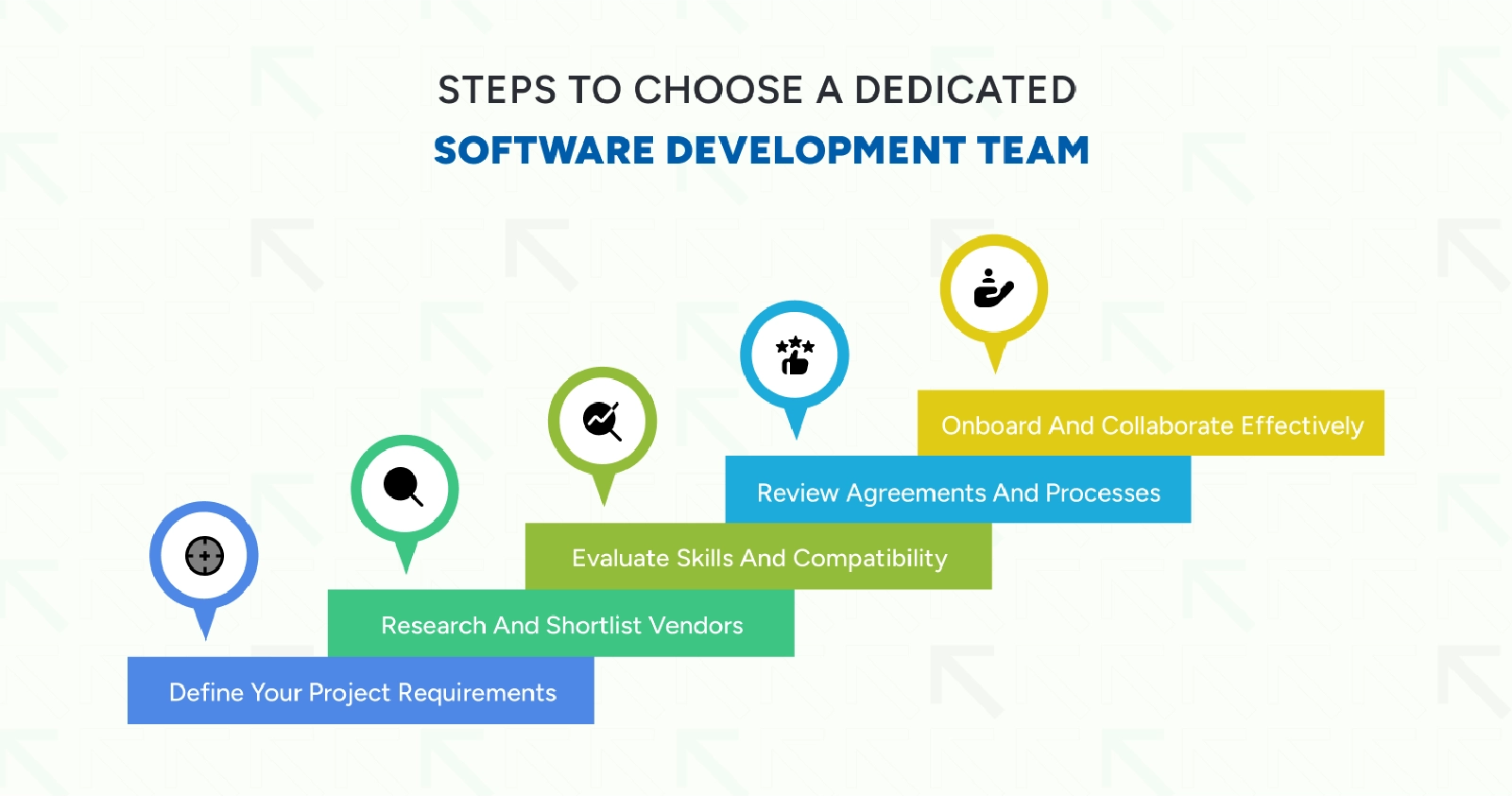
Choosing the best dedicated software development team requires a structured approach that aligns your project’s scope, technology needs, and collaboration goals. The ideal team should feel like a strategic extension of your company, not just an outsourced vendor.
1. Define Your Project Requirements
Outline project goals, target audience, technical stack, budget, and timeline. Determine whether you require full-cycle development or specialized module expertise, such as mobile app development or data engineering services.
2. Research and Shortlist Vendors
Scout potential partners on platforms like Clutch, GoodFirms, and LinkedIn. Analyze case studies, past projects, and success in similar industries. Prioritize vendors who demonstrate consistent project delivery and transparent pricing.
3. Evaluate Skills and Compatibility
Interview selected teams to gauge technical expertise, collaboration style, and adaptability. Request sample code or conduct a small pilot to validate hands-on proficiency. You can also review their past projects, portfolio, and case study for a deeper understanding of their software development approach.
4. Review Agreements and Processes
Scrutinize contract terms, ensure clarity on intellectual property rights, timelines, payment milestones, and scope of work. Finalize mutual expectations before development begins. Additionally, you can conduct one-on-one interviews with their past clients to understand if a software development service provider has delivered projects on time and what the quality of their deliverables was.
5. Onboard and Collaborate Effectively
Give your new team access to the necessary tools, documents, and communication channels. Schedule regular sprint reviews, stand-ups, and KPI-based performance checks.
If you are a business looking to build software with a dedicated team, the above action points are enough to find one. However, many companies face challenges and complexities in finding a dedicated development team.
What are the Challenges of Finding The Right Dedicated Software Development Team?
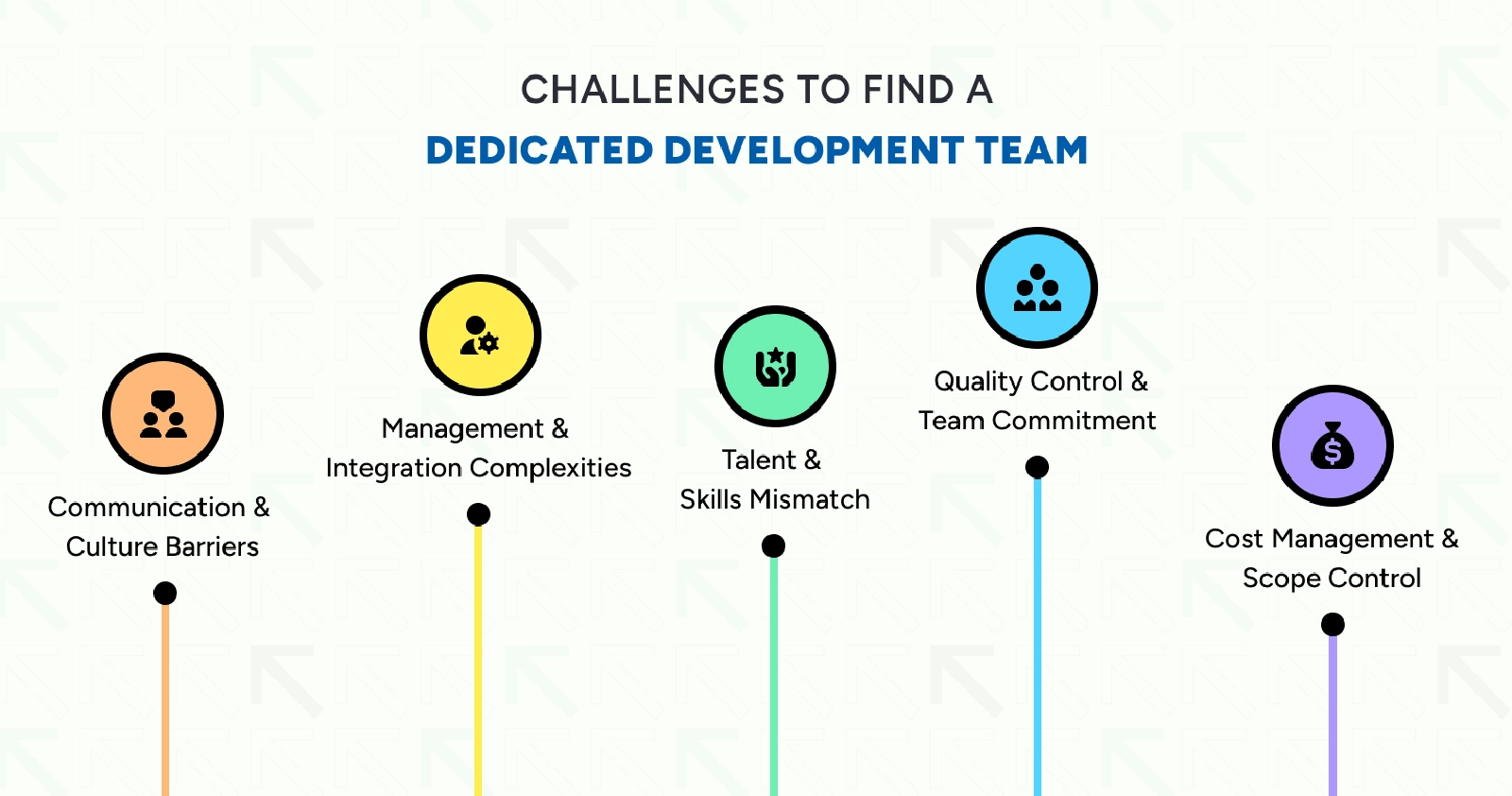
Finding the right dedicated software development team can accelerate your project’s success, but the process presents several unique challenges that go beyond basic hiring.
Below is a breakdown of the main hurdles and proven ways to overcome them:
1. Communication & Culture Barriers
A significant challenge for most businesses is the time zone differences. It can cause delays and limit real-time collaboration., Additionally, there are cultural and language gaps that lead to misunderstandings and differences in work style.
Expert Tip
2. Management & Integration Complexities
Managing and motivating a remote team is more challenging than managing an in-house team, especially when there is a lack of project management expertise. When you build your own team (BYOT) remotely, integrating new members into your workflow and maintaining consistent project updates requires extra attention and effort.
Expert Tip
3. Talent & Skills Mismatch
Finding developers who possess the exact technical expertise for your project, especially in niche domains, can be challenging. Skill gaps may emerge if constant upskilling and code reviews aren’t enforced.
Expert Tip
4. Quality Control & Team Commitment
Sustaining high development quality and ensuring ongoing team focus can be harder with remote or external teams. And it’s difficult to know if the team is juggling multiple clients.
Expert Tip
5. Cost Management & Scope Control
While hiring dedicated teams can be cost-effective, hidden costs may arise due to communication lags or scope creep. Additionally, unclear responsibilities can lead to budget overruns.
Expert Tip
How Ace Infoway Helps You With a Dedicated Software Development Team?
Partnering with a truly expert software development company can make all the difference in overcoming the challenges of hiring and managing a dedicated team. Ace Infoway provides dedicated software development teams that effectively address challenges such as time zone discrepancies, communication barriers, integration complexities, and specialized expertise requirements.
Ace Infoway has established itself in software development for more than two decades and has a proven track record of delivering high-impact solutions across industries such as healthcare, eCommerce, SaaS, and enterprise technology. Such extensive experience has been pivotal for our teams in gaining deep knowledge and in catering to the unique needs of businesses across sectors.
What Sets Ace Infoway’s Dedicated Teams Apart?
- Tailored Talent: Access to top engineers, UI/UX designers, and QA specialists curated to match your technology stack and industry needs.
- Seamless Collaboration: Advanced tools, transparent reporting, and dedicated project managers bridge geographic and cultural divides, fostering seamless collaboration.
- Quality and Reliability: Rigorous code reviews, milestone-based delivery, and ISO-certified processes guarantee quality and accountability.
- Scalable Flexibility: Swiftly ramp up or down your team as requirements evolve without losing pace or productivity.
- End-to-End Security: Robust data protection and intellectual property safeguards built into every engagement.
Contact Ace Infoway to discover how our dedicated development teams can bring your vision to life from concept to launch and beyond.
FAQs
1. How fast can Ace Infoway onboard a dedicated development team?
Most teams are fully onboarded and ready to start within 1–2 weeks, complete with access to resources, process alignment, and clear communication channels.
2. What industries does Ace Infoway serve with dedicated teams?
We specialize in healthcare, finance, eCommerce, SaaS, logistics, and custom enterprise software, delivering tailored solutions for startups and global enterprises alike.
3. How does Ace Infoway ensure communication and collaboration with clients in different time zones?
Ace Infoway ensures seamless communication with global clients through dedicated project managers who coordinate daily stand-ups or weekly sprint reviews in your preferred time zones, including EST, PST, GMT, and APAC. We leverage centralized communication platforms like Slack and Microsoft Teams for instant messaging.
At the same time, we use cloud-based project management tools, including Jira, Asana, ClickUp, and Zoho Projects, to provide 24/7 visibility into project progress, task updates, and milestone tracking. This infrastructure guarantees response times of 2-4 business hours, regardless of time zone differences.
Plus, Ace Infoway has been in software development for more than 2 decades. So we have a team of experienced software development experts with whom you can connect to receive clear status reports and strategic recommendations throughout the SDLC.
4. What distinguishes the skills and expertise of Ace Infoway’s developers?
Ace Infoway’s developers bring exceptional technical depth across multiple technology stacks and frameworks, including Python, Java, PHP, Node.js, React, Angular, Vue.js, Flutter, React Native, Swift, and Kotlin. Each developer undergoes rigorous vetting processes and maintains up-to-date certifications in their respective domains.
Beyond technical proficiency, our team possesses specialized domain expertise across healthcare, finance, logistics, retail, and manufacturing, with a thorough understanding of compliance requirements such as HIPAA, GDPR, PCI-DSS, and SOC 2. This specialized knowledge ensures solutions are technically sound and aligned with industry standards and business objectives.
Our team’s hands-on experience across web, mobile, and enterprise projects, along with strong DevOps and automation skills, ensures we deliver scalable, secure, and innovative solutions for a global clientele. Developers operate within Agile frameworks, utilizing CI/CD pipelines, automated testing suites, and containerization technologies such as Docker and Kubernetes.
Ace Infoway invests significantly in continuous upskilling through regular training programs, hackathons, and premium learning platforms, keeping teams current with emerging technologies, including AI/ML integration, blockchain development, cloud-native architectures (AWS, Azure, Google Cloud), and microservices patterns.
5. How is project quality and data security maintained?
At Ace Infoway, project quality and data security are maintained through a robust combination of mature development processes, stringent QA best practices, and industry-standard security measures. We use clear quality goals, detailed test strategies, automation frameworks, and CI/CD pipelines for consistent delivery and early defect detection.
Regular code reviews and progress tracking by our dedicated software development teams ensure adherence to coding standards and maintainability. Data security is reinforced by strong encryption, access controls, routine audits, and adherence to global regulations, while partner selection further safeguards confidentiality. Transparent communication and thorough documentation foster accountability, resulting in reliable, secure solutions that consistently meet client expectations.














